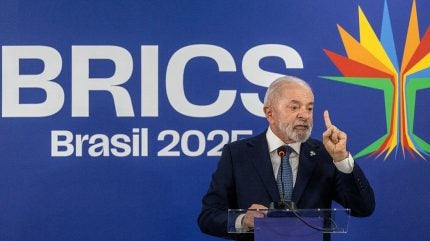
US President Donald Trump threatened to impose 50% tariffs on Brazilian goods through a letter posted on social media yesterday (July 9).
He cited the trial of close ally and former Brazilian President Jair Bolsonaro, which he called a “witch hunt”, and Brazil’s clashes with US tech companies as reasons for the tariffs, which he said would go into effect on 1 August. Bolsonaro is facing a trial for his alleged role in a 2022 coup attempt.

Discover B2B Marketing That Performs
Combine business intelligence and editorial excellence to reach engaged professionals across 36 leading media platforms.
Brazilian President Luis Inácio Lula da Silva responded through a social media post, saying that if the US imposed tariffs, the country would reciprocate and match US rates. Lula emphasised that Brazil is “a sovereign country with independent institutions and will not accept any tutelage”.
“Given the stark divergence between both administrations, a slow-burning confrontation between Washington and Brasília was on the cards from the get-go,” Mariano Machado, principal analyst for the Americas at Verisk Maplecroft, said in an email note to Investment Monitor.
“President Luiz Inácio Lula da Silva’s doctrine of ‘active non-alignment’ was always destined to draw scrutiny from the US administration.”
When Trump announced ‘reciprocal’ tariffs in April, Brazil faced the lowest possible rate at 10%. These tariffs were quickly postponed for a 90-day period, which ended on 9 July. As was expected by many, this deadline was once again delayed by three weeks, until 1 August. Only two trade deals have been reached in the three months of negotiations, with Vietnam and the UK.

US Tariffs are shifting - will you react or anticipate?
Don’t let policy changes catch you off guard. Stay proactive with real-time data and expert analysis.
By GlobalDataThe tariff threats on Brazil are also unusual because, according to US Government data, the US had a trade surplus with Brazil of $7.4b in 2024, as opposed to many other countries that were targeted with high tariffs, with which the US has trade deficits. Lula highlighted this in his post, calling Trump’s claim that the US has a trade deficit with Brazil “inaccurate.”
“Though the current dispute is framed in bilateral terms, geopolitical dynamics are the driving force. Brazil has walked a fine line between commercial interest and political positioning — evident in the cautiously worded 16,000-word BRICS declaration,” Machado outlined.
“A string of recent agreements with China on critical infrastructure appears to have recalibrated Washington’s view of Brazil’s strategic alignment.”
The warnings against Brazil came a few days after Trump threatened to impose additional tariffs on member countries of BRICS over what he called their “anti-American policies”. BRICS leaders recently gathered in Rio de Janeiro, Brazil, where they released a joint statement in which they criticised uneven tariff policies, military strikes on Iran and called on Israel to withdraw its military from the Gaza Strip.
In terms of the effects that the tariffs could have if imposed, Machado suggested that a “50% tariff turns Brazil’s principal export artery into a liability overnight”.
He warned: “Crude oil, iron ore, aircraft, pulp, coffee, and beef – together accounting for roughly 75% of Brazil’s $40.3bn in exports to the US last year – now face margin compression so steep that several could become commercially unviable or lose market share within weeks.”





